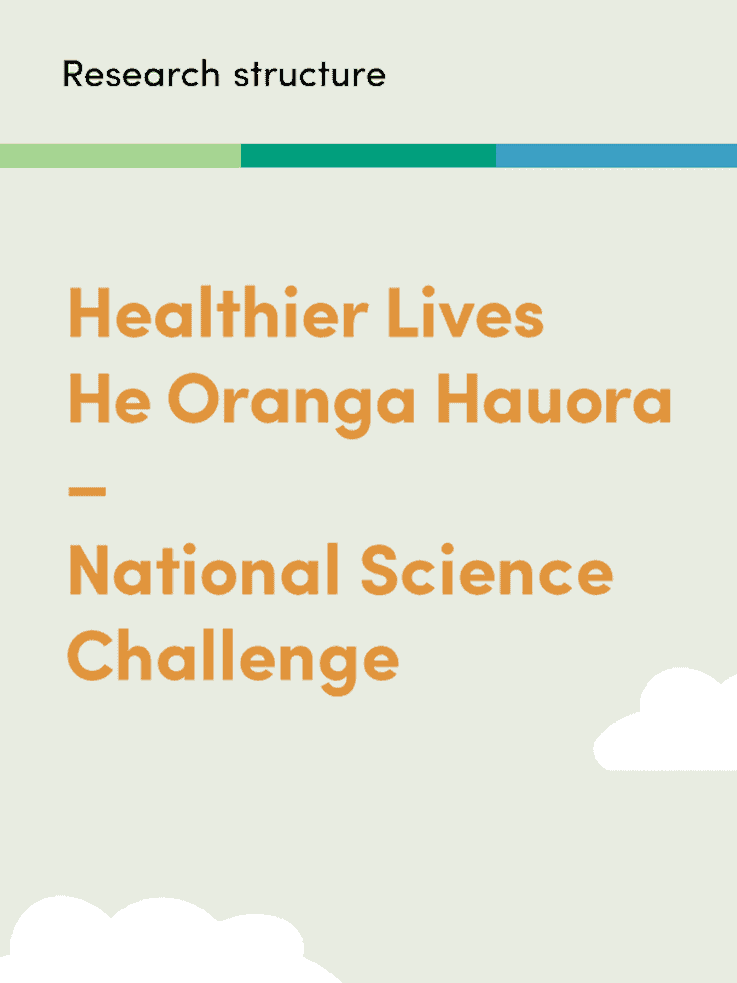Healthier Lives undertakes collaborative research aimed at equitably improving the prevention and treatment of four major non-communicable diseases: Cancer • Cardiovascular Disease • Diabetes • Obesity
Research Themes
Many factors have an impact on the health of New Zealanders, including systems that affect the whole population, cultural factors that relate to particular communities, and the genetic make-up and life experiences of individuals. Healthier Lives’ research is therefore focussed within three themes:
Healthy food and physical activity environments
Culturally centred health interventions for Māori and Pacific peoples
Precision medicine and personalised prevention
Healthier Lives – He Oranga Hauora
2019-2024 Research Strategy
To develop Healthier Lives’ 2019–2024 Research Strategy we consulted community partners, stakeholders, policy-makers and researchers, national and international experts, and interested members of the general public.
At the heart of the strategy is a vision of Aotearoa New Zealand with equitable health outcomes and a substantially reduced burden of non-communicable diseases.
Healthier Lives’ research activities are guided by these principles
Achieving equitable health outcomes for all groups within the New Zealand population, including Māori and Pacific peoples, people living in rural areas, and people who experience social deprivation.
Enacting Treaty partnership and embedding MBIE’s Vision Mātauranga policy to meet obligations to New Zealand’s Indigenous population.
Co-designing research with partners so that research outcomes are useful and sustainable in the real world.
Download our research investment guidelines and process.
Scoping and Prioritising Research
Our 2019-2024 research portfolio is a mix of continuing and new research. To commission new research we undertook a series of scoping and prioritising exercises:
Theme 1: Healthy food and physical activity environments
- Healthy food and physical activity environments workshop report [PDF 2 MB]
- Healthy food and physical activity environments stocktake [PDF 1.3 MB]
Theme 2: Culturally centred health interventions for Māori and Pacific peoples
- Culturally-centred health interventions for Māori hui report [PDF 2 MB]
- Culturally-centred health interventions for Pacific peoples fono report [PDF 1MB]
Research Voices
Research voices: Dr Cloe Posimani
Dr Cloe Posimani is a medical doctor engaging with public health research to benefit the country of…
Research voices: Els Russell
Els Russell sees herself as lucky to be surrounded by strong women who value education and learning,…
Research voices: Truely Harding
Dr Truely Harding has navigated both Māori and Pākehā worlds her whole life, and this has shaped…
Research voices: Elizabeth Okiakama
Kia orana! Elizabeth Okiakama is a community-based researcher who worked on the Pasifika Prediabetes Youth Empowerment Programme…
Research voices: Dr Sandra Fitzgerald
Sandra Fitzgerald finished her PhD in 2021, working in the laboratory of Professor Cris Print and Dr…
Research voices: Dr Dani Prapavessis
Dr Danielle (Dani) Prapavessis, a proud ‘Kiwi Canadian’, jumped at the chance to do her PhD in…
Partnerships to extend research
Several funding partnerships extend the scope of Healthier Lives’ research:
- The Health Research Council of New Zealand, the Ministry of Health and Healthier Lives formed the Long-Term Conditions Partnership to investigate innovative approaches to delivering care to people living with long-term conditions in the most affected populations. Together we invested $7.9 million in five research projects.
Read more about the projects: BetaMe, Food4Health, Mana Tu, PPYEP and WellConnectedNZ.
- The Heart Foundation of New Zealand and Healthier Lives formed a joint research venture aimed at achieving equity in cardiovascular health outcomes. Manawataki : Fatu Fatu, a $2 million research programme, investigates ways to overcome the gap between evidence and practice in treatment of cardiovascular disease for Māori and Pacific people.
Read more about the Manawataki : Fatu Fatu project.
- The Institute of Environmental Science and Research (ESR) and Healthier Lives teamed up to support the development of emerging researchers. One focus of this research is to look for biological markers of type 2 diabetes to distinguish patients for more targeted approaches and improve treatment outcomes. The other is to understand the complexity of interventions to prevent non-communicable disease, from the perspectives of the health system and community.
Non-communicable diseases – why is research needed?
Non-communicable diseases (NCDs) are New Zealand’s most pressing health problem.
NCDs have reached pandemic proportions globally, accounting for more than 70% of death and disability worldwide and 89% of all deaths in Aotearoa.
Cancer, cardiovascular disease (CVD), diabetes and obesity account for well over a third of total health loss in New Zealand, often affecting people in the prime of life. The personal cost to New Zealanders is incalculable – almost all of us are affected in some way. The cost to the nation is hundreds of millions of dollars each year.
For example:
- New Zealand has the world’s second highest reported rate of cancer and our cancer survival rates are significantly behind comparable countries such as Australia and Canada.
- More than 165,000 New Zealand adults (or 1 in 20) have been diagnosed with cardiovascular disease, which is responsible for almost a third of all deaths. New Zealand’s death rate from heart disease is considerably higher than comparable countries such as Australia, the United Kingdom, Canada and the United States.
- Diabetes is Aotearoa’s fastest growing NCD. It is estimated that more than 200,000 New Zealanders have been diagnosed with diabetes (predominantly type 2 diabetes) and a further 25% of the population may have pre-diabetes, a condition which can often lead to type 2 diabetes.
- New Zealand has the third highest adult obesity rate amongst the OECD countries. One in three adult New Zealanders (over 15 years) is classified as obese and this rate continues to increase. While childhood obesity rates have recently shown signs of stabilising, one in ten New Zealand children are currently classified as obese.
The burden of NCDs is not borne equally across the New Zealand population. For example:
- There are marked and ongoing ethnic and socioeconomic inequalities in the incidence and death rates of some cancers;
- The total cardiovascular disease death rate among Māori is more than twice as high as that among non-Māori. Despite proven treatments that can halve rates of heart disease, Māori and Pacific people are less likely to receive preventive treatment and more likely to experience delays in getting to hospital;
- Diabetes is more than twice as common in Pacific populations compared with the overall New Zealand population, and it is also high among Māori and South Asian populations;
- There are major socioeconomic inequalities in obesity rates and risk factors for NCDs.
Research evidence is needed to inform future policies and programmes that will be effective in equitably reducing the enormous burden of non-communicable diseases.







